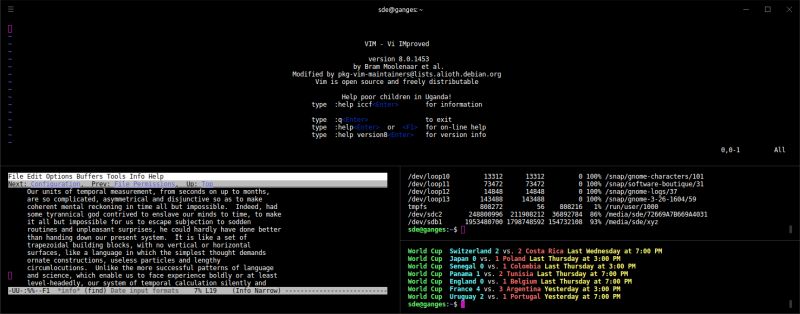Hyper is a popular open source Electron-based terminal emulator.
The goal of the project is to create a beautiful and extensible experience for command-line interface users, built on open web standards.
Hyper is built on HTML/CSS/JSS. Most of the speed and functionality of Hyper derives from xterm.js, a terminal front-end component written in Java. Previously Hyper was powered by hterm, a sub-project of Chromium.
Features include:
- Highly customizable – customize, share or backup your configuration; there’s a single file to configure the terminal to your specific requirements (.hyper.js).
- High performance Canvas based rendering engine.
- Split windows horizontally and vertically.
- Support for tabs.
- Hot-load and hot-reload plugins.
- Window cascading.
- All command keys can be changed.
- Wide range of themes are available. For example, you can opt for a theme that adapts to the macOS UI, a material theme, themes that are attractive for developers, a tailor-made Pokemon theme, a whimsical theme, or even a solarized theme.
- Foreign keyboard support – type characters such as á, ä.
- Good support for hyperlinks.
- Online catalog of plugins and themes.
- hyper CLI to install plugins and themes with one command (e.g. type ‘hyper i hypercd’ installs the hypercwd).
- Extensions to add functionality. They are universal Node.js modules loaded by both Electron and the renderer process. There’s an excellent range of extensions that are available such as hypercwd which lets you open new tabs with the same directory as the current tab. hyper-search is also another handy extension which offers the ability to search text in the terminal.
- Good internationalization support.
- Cross-platform support – runs under Linux, macOS, and Windows operating systems. Easy installation – there are packages for Debian and Fedora based distributions. And for other distributions, there’s an AppImage.
Website: hyper.is
Support: GitHub code repository
Developer: ZEIT, Inc.
License: MIT License

Hyper is written in TypeScript. Learn TypeScript with our recommended free books and free tutorials.
Return to Terminal Emulators | Return to Terminals Built on Web Technologies
| Popular series | |
|---|---|
| The largest compilation of the best free and open source software in the universe. Each article is supplied with a legendary ratings chart helping you to make informed decisions. | |
| Hundreds of in-depth reviews offering our unbiased and expert opinion on software. We offer helpful and impartial information. | |
| The Big List of Active Linux Distros is a large compilation of actively developed Linux distributions. | |
| Replace proprietary software with open source alternatives: Google, Microsoft, Apple, Adobe, IBM, Autodesk, Oracle, Atlassian, Corel, Cisco, Intuit, and SAS. | |
| Awesome Free Linux Games Tools showcases a series of tools that making gaming on Linux a more pleasurable experience. This is a new series. | |
| Machine Learning explores practical applications of machine learning and deep learning from a Linux perspective. We've written reviews of more than 40 self-hosted apps. All are free and open source. | |
| New to Linux? Read our Linux for Starters series. We start right at the basics and teach you everything you need to know to get started with Linux. | |
| Alternatives to popular CLI tools showcases essential tools that are modern replacements for core Linux utilities. | |
| Essential Linux system tools focuses on small, indispensable utilities, useful for system administrators as well as regular users. | |
| Linux utilities to maximise your productivity. Small, indispensable tools, useful for anyone running a Linux machine. | |
| Surveys popular streaming services from a Linux perspective: Amazon Music Unlimited, Myuzi, Spotify, Deezer, Tidal. | |
| Saving Money with Linux looks at how you can reduce your energy bills running Linux. | |
| Home computers became commonplace in the 1980s. Emulate home computers including the Commodore 64, Amiga, Atari ST, ZX81, Amstrad CPC, and ZX Spectrum. | |
| Now and Then examines how promising open source software fared over the years. It can be a bumpy ride. | |
| Linux at Home looks at a range of home activities where Linux can play its part, making the most of our time at home, keeping active and engaged. | |
| Linux Candy reveals the lighter side of Linux. Have some fun and escape from the daily drudgery. | |
| Getting Started with Docker helps you master Docker, a set of platform as a service products that delivers software in packages called containers. | |
| Best Free Android Apps. We showcase free Android apps that are definitely worth downloading. There's a strict eligibility criteria for inclusion in this series. | |
| These best free books accelerate your learning of every programming language. Learn a new language today! | |
| These free tutorials offer the perfect tonic to our free programming books series. | |
| Linux Around The World showcases usergroups that are relevant to Linux enthusiasts. Great ways to meet up with fellow enthusiasts. | |
| Stars and Stripes is an occasional series looking at the impact of Linux in the USA. | |
